
Alphabetical Menu
Chronological Menu
|
Brighton 4th 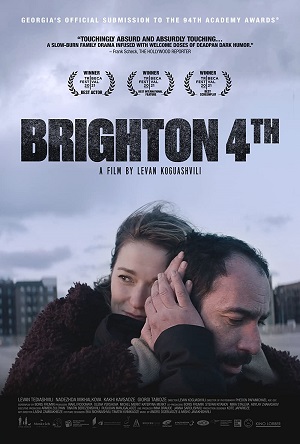 Kakhi (Levan Tediashvili), a former professional wrestler, travels from Tbilisi to Brighton Beach in Brooklyn, New York to help his son, Soso (Giorgi Tabidze), deal with a gambling debt to Amir (Yuri Zur). Soso had borrowed money from Kakhi and moved to Brighton Beach in hopes of pursuing a career in medicine and paying Lena (Nadezhda Mikalkova) to marry him, but instead he got addicted to gambling and must pay Amir back or else his life remains at stake. It's up to Kakhi to protect and help his beloved, troubled son. At heart, Brighton 4th is a story about a father who will do anything to be there for his son like any good parent would. After all, it's the job of a parent to protect their child from harm and to love them unconditionally the way that Kakhi does. The screenplay by Boris Frumin approaches that narrative in a way that's reminiscent of how Ken Loach tackles the issues of poverty, family dynamics and socioeconomic issues. Kahki does his best to make ends meet when he visits Brighton Beach, and the film doesn't shy away from showing the details of his struggles without any sugar-coating. Even though Bright 4th doesn't veer into thriller territory, it always flirts with it because the danger and menace of the gangsters that Soso got caught up with remains a foreboding, imminent threat. Director Levan Koguashvili and screenwriter Boris Frumin keep the tension understated which, in a way, feels more powerful because it relies more on the audience's imagination to wonder when and if something very dark and tragic will occur. That makes the film somewhat suspenseful in the way that Hitchcock defines suspense: suspense comes from the anticipation of an event that will transpire. Fortunately, the filmmakers don't go over-the-top in the intense third act, so it's a testament to their filmmaking skills that they show restraint. This isn't the kind of film that relies on violence, gore or shock value. They trust the audience's patience because they focus on Kakhi's experiences until the third act, so by then the audience cares about what will happen to Kakhi and his son and feel emotionally invested in their struggles. . Director Levan Koguashbili should be commended for not resorting to shaky cam as a means of generating tension. He achieves tension mostly from the well-written screenplay. The nuanced performances add to the film's authenticity while the cinematography, which includes mostly washed-out, dreary colors, add to the film's atmosphere and tone. Sometimes style can become part of a film's substance which is the case here without allowing style to overpower the substance. Moreover, Brighton 4th moves at an unhurried pace which is yet another sign that the filmmakers trust the audience's patience. Patience, after all, can be rewarding, so this is the kind of film that's most rewarding for patient audiences who don't need quick cuts to be entertained. There's nothing too showy about the camerawork, but, at the same time, there doesn't need to be. At a running time of 1 hour 30 minutes, Brighton 4th is genuinely heartfelt, gripping and unflinching with shades of Ken Loach. 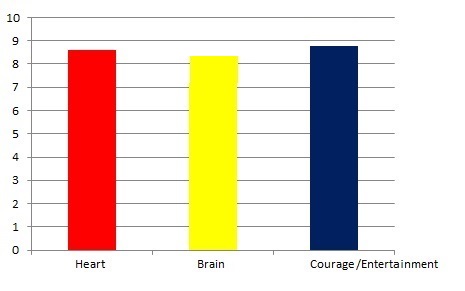 Rifkin's Festival 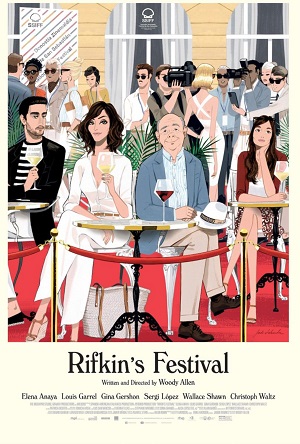 Mort Rifkin (Wallace Shawn), a retired film studies professor, travels with his wife, Sue (Gina Gershon), to the Sebastian Film Festival in Spain. She works as a publicist and has a few clients at the festival, including filmmaker Phllippe (Louis Garrel). As their marriage grows stale, Gina has an affair with Philippe while Mort flirts with a local doctor, Jo Rojas (Elena Anaya), who's stuck in a toxic marriage with an abusive, cheating husband, Pac (Sergi Lopez). Writer/director Woody Allen bites off more than he could chew as he combines drama, romance and satire with uneven results. He frames the film as a flashback as Rifkin recalls his experiences at the festival while seeing a therapist whose comments aren't shown to the audience. Is Rifkin actually talking to the audience then? It sure seems that way, especially during Rifkin's voice-over narration. Woody Allen uses narration yet again to move the plot forward and to get inside its protagonist's head, but it seems like a lazy way to do it this time around. What about getting isde the head of Rifkin's wife? Why don't we hear a little bit of her narration for a change? She's going through as much struggle as Rifkin is. Their marriage seems to have hit rock bottom, and Rifkin isn't helping matters by seeing another woman. They're both emotionally immature. Rifkin lies to his wife about the real reason he comes back late one night, and even lies about a physical ailment just to be able to visit Jo Rojas' office, so he seems like a creepy, immature boy, not a man. Why should the audience believe anything that he tells them or his therapist in the voice-over narration? He's essentially an unreliable narrator.
Except for Philippe, every one of the main and supporting characters in the film cheats on their spouse or at least considers it, so they're far from likable. That would've been forgivable if the characters were to come to life, but very little happens that feels organic and true-to-life, unfortunately, and the film has little to say about monogamy, marriage or happiness. Moreover, Rifkin's character arc isn't believable at all, so the third act's emotional beats don't land. His relationship with Jo Rojas seems like more of a fairy tale than reality, yet it takes it too seriously and expects the audience to believe that Jo Rojas would want to drop everything and spend time with Mort all of a sudden. The Hairdresser's Husband did a better job of captivating the audience with a bittersweet fairy tale romance without trying to convince the audience that it's reality.
Unfortunately, Rifkin's Festival doesn't quite work as a comedy or satire either. Woody Allen already poked fun at Hollywood with much more wit in Celebrity and Hollywood Ending. He explored the romantic comedy genre with much more humor in Manhattan, Annie Hall and Husbands and Wives, so he's clearly capable of writing a funny and wise dramedy. He's merely playing it safe with Rifkin's Festival without the laughs you'd expect from his films or the witty banter or quips either. Great comedy is rooted in tragedy as well as humanism, but there's not nearly enough of the latter in Rifkin's Festival, although there's plenty of tragedy, so it's a shame that he doesn't explore the darker elements more. Allen instead opts for yet another breezy, whimsical approach to a serious subject instead of taking a deeper and more moving approach like in the far superior character study Blue Jasmine or the study of a marriage, Husbands and Wives. There are amusing dream sequences in black-and-white with plenty of film references to the filmmakers who Woody Allen clearly loves, i.e. Ingmar Bergman, but those dream sequences eventually become repetitive and too obvious. It's an insult to the audience's intelligence that he flashes back to the film homages with a montage in the third act. The audience will wish that they were watching The Seventh Seal, Jules and Jim, or Wild Strawberries instead. For a much more witty and wise blend of humor and bittersweetness that also deals with a crumbling marriage, see Shirley Valentine. Both Rifkin's Festival and Shirley Valentine often incorporate narration, but Shirley Valentine does it with more warmth, honesty and emotional depth. At a running time of 1 hour and 32 minutes, Rifkin's Festival is harmless and occasionally amusing, but ultimately too witless, dull and shallow. 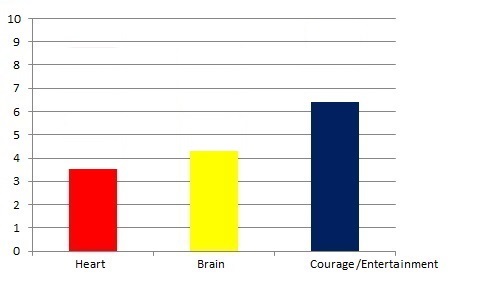 Sundown 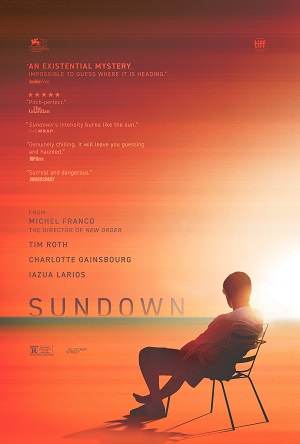 Neil (Tim Roth) travels to Acapulco with Alice (Charlotte Gainsbourg) and her teenaged children, Alexa (Albertine Kotting McMillan) and Colin (Samuel Bottomley), for a tropical vacation at an oceanside resort. When Alice says that she must return home upon learning that her mother is very sick, she brings him and her two kids to the airport right as their plane is about to board. However, he suddenly claims that he forgot his passport, so he returns to the resort while they depart without him. Sundown sounds like a simple, straightforward story about a dysfunctional family, but it turns out that it's not simple at all. Writer/director Michel Franco has been known for playing around with exposition so that the audience doesn't know everything that they need to know right away, even key pieces of information like the relationship between Neil and Alice. Are they a husband and wife? Boyfriend and girlfriend? Brother and sister? Cousins? Franco expects the audience to be patient and to play close attention to the details to come to their own conclusions. Neil is put to the test with many tragic situations. Just when you think it's going in one direction and that there might be some hope, it goes in a direction that you least expect it to. It veers somewhat into thriller territory, but it's more of a psychological thriller than a palpable, edge-of-your-seat thriller. Franco leaves much of the horror and grittiness to the audience's imagination, i.e. an accident that happens to one of the characters which the camera doesn't show because it cuts away before it actually occurs. Without giving away any spoilers, the plot gets increasingly dark and twisted in a way that's almost Shakespearian or like A Serious Man minutes the comedy. Is Neil like Job? Perhaps. That's left to the audience's interpretation like many parts of Sundown, so this isn't an easy film to digest on an emotional or intellectual level, nor does it try to be. Tim Roth gives a moving performance in a role that has most of his emotions internally. There's no voice-over narration. It's hard to understand at times what Neil is thinking or feeling, but Roth is skilled enough as an actor to get inside of Neil's head and help the audience to experience a glimpse of that as well. Neil still remains somewhat of an enigma by the film's end, and the same can be said about Alice. Much of the emotional burden of Sundown is on Tim Roth, so it's very fortunate that he carries the film's emotional weight. The emotional depth comes from his performance, not from the screenplay. Director Michel Franco should also be commended for maintaining a slow, leisurely pace and for keeping the running time under 90 minutes, so it doesn't become tedious. He shows restraint with regards to how to end the film, with exposition, and with how much of the tragedies to leave to the audience's imagination. At a running time of just 1 hour and 23 minutes, Sundown is provocative, enigmatic and haunting. 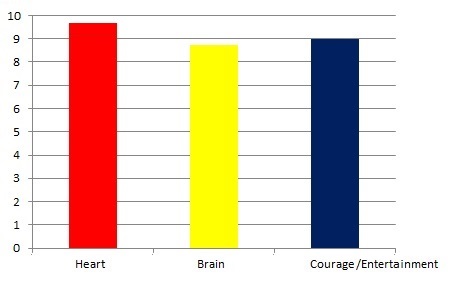 |